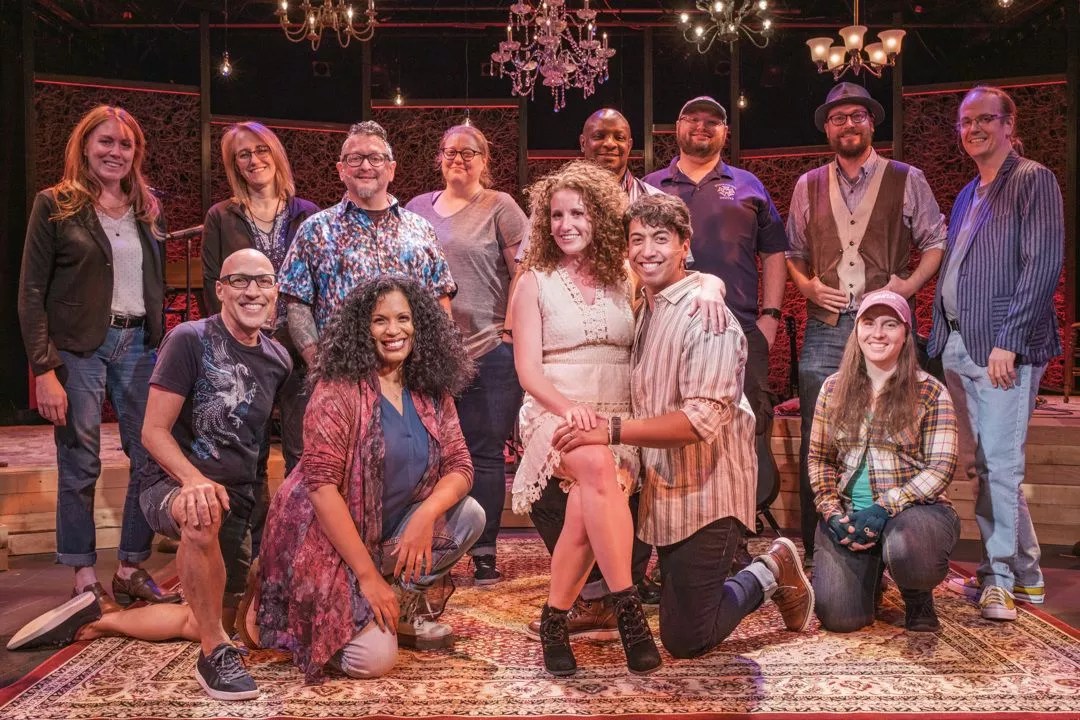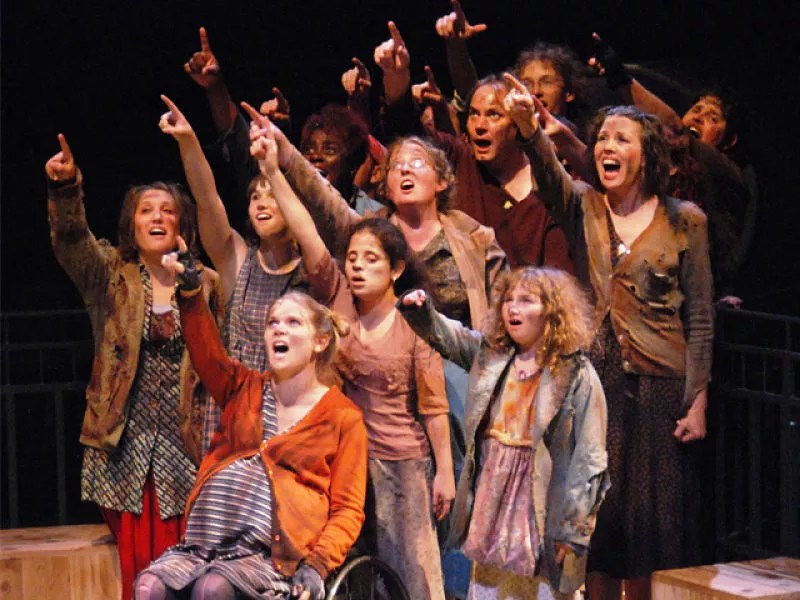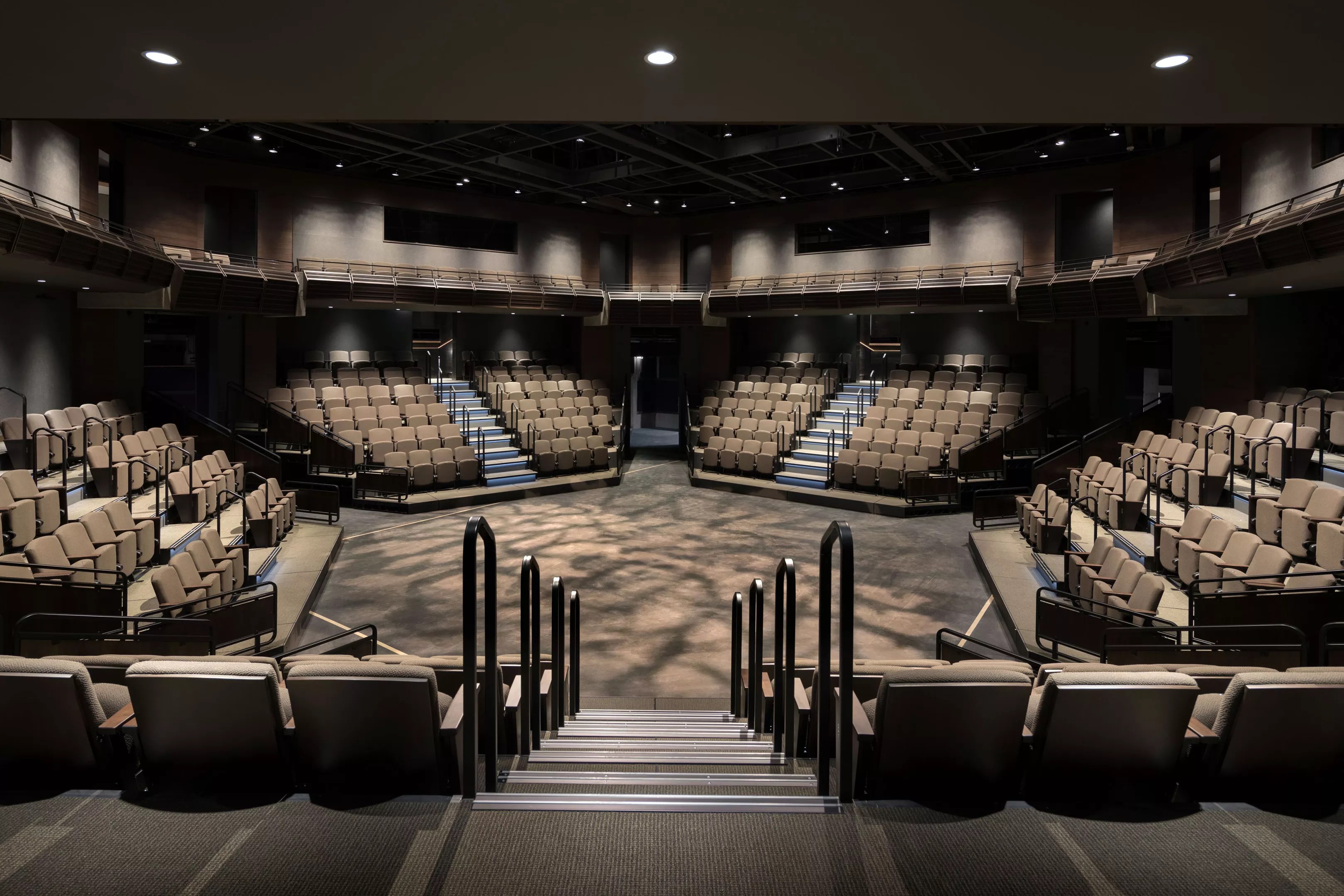
Elicia James

Audio By Carbonatix
Fall is traditionally the start of the new theater season, and companies all over the Denver area are roaring back into action with musicals, comedies, tragedies, thoughtful pieces that explore our times, or spun-sugar escapist fare. Each company has its own approach to the future, and each has reacted differently to the virus-induced limitations of the past year. But almost all of them have sought out new ways of communicating with audiences: streaming shows, holding outdoor concerts and performing to limited h
ouses – and quite a few will continue exploring those avenues now that in-person performances are coming back.
The changes weren’t just related to COVID-19, however. Some were inspired by the Black Lives Matter movement, and some by changes in artists’ personal lives, as well as by the enforced timeout.
Amanda Berg Wilson, founder of the Catamounts, says that after she realized the shutdown was going to last more than a few weeks, her first response was to take “a big theater-producing nap. Being a theater artist is a sort of relentless amount of hustle, so I was like, ‘Maybe doing nothing for a while will be nice.’ But then I thought a bit deeper about the Catamounts’ mission statement, part of which says that we’re dedicated to the constant reinvention of artistic forms, and realized that we had unknowingly given ourselves a path through the pandemic back before we ever imagined such a thing being part of our history. We were going to have to figure out how to reinvent theater in a time of, well, no theater.”
As a result, the Catamounts produced a show on a golf course in which audience members rode in golf carts, in partnership with the City of Westminster; presented an immersive piece on Zoom; and in June offered a site-specific, partially outdoor play with a script by playwright Jeffrey Neuman.
Because the Catamounts is a small, nimble group that doesn’t own a building or pay regular rent and has only one employee – Berg Wilson – the year did not bring financial hardship. In addition to a PPP loan and a grant from the City of Boulder, the company benefited from the loyalty of patrons. The runs for all three shows had to be extended, and still left long waiting lists. It was “a nice reminder that theater is important to folks,” says Berg Wilson.

Theater happened in unusual places.
The Catamounts
But the pandemic took a devastating toll on the Denver Center for the Performing Arts, which has been dark for the past year. Staff numbers dropped “through furloughs, some contracts ended, hours were reduced, some forty positions were eliminated…. Hands down, the people that make the magic happen have taken the greatest impact,” says president and CEO Janice Sinden. “My heart and head are deeply focused on how to bring the center back up and make sure we don’t have to shut down again. I can’t even fathom what that would feel like for everybody – patrons, artists, audiences. And it would be detrimental to the broader arts and cultural sectors, too.”
Gone for good is Germinal Stage, one of Denver’s earliest and most respected companies. After leaving its longtime home a few years ago, Germinal Stage finally ceased production altogether. And in September, founder and artistic director Ed Baierlein sent out word that Germinal Stage Inc. had been officially dissolved.
BDT Stage saw a major change as director Michael J. Duran took a step back after eighteen years and handed over the reins to longtime colleague Seamus McDonough – though Duran intends to remain involved. “My father was the original employee in 1977,” McDonough says. “I was literally born and raised in the building. I started in 1999 as a busser, and then started stage-managing.”
McDonough became Duran’s assistant artistic director a year and a half ago and learned a great deal about running the company. Still, he says now, “we didn’t know if we were going to be coming back.”
But BDT Stage has come back, with Avenue Q currently playing, White Christmas scheduled for the holidays, and two more full-length musicals on the books for spring. Several concerts will fill this year’s gaps as the company revs up for next year, when, says McDonough, “we can get back to what we were known to do.”
One of the things BDT Stage was known to do was employ a semi-permanent group of actors; over the past year, most of them needed to take on regular jobs. “For nine months, we were down to single digits of people on staff,” says McDonough. Given the uncertainties of the time, few of the actors feel secure enough to give up those other jobs yet, so rehearsals are currently scheduled for evenings. But BDT Stage has always nurtured a strong sense of community among performers and between performers and audiences, and many favorite actors have returned.
There have been other departures. Rachel Rogers, co-founder of Benchmark Theatre, left her post last January for personal reasons, and fellow founder Haley Johnson gave birth to a son in April. Johnson will remain executive director and has assembled a skilled team to work with her in keeping Benchmark going, including Neil Truglio as artistic director. Benchmark’s first post-pandemic offering, Elephant, by three local playwrights, is already selling out much of its run that starts October 8, and the rest of the season has just been announced.

Alice in Wonderland took advantage of online options.
Phamaly
Regan Linton, a talented actor who began using a wheelchair after an early car accident, worked with Phamaly, a creative home for theater artists with disabilities, for several years before taking over as artistic director in 2017. She helped Phamaly achieve financial stability and brought national attention to disability issues and the need for inclusion in theater. Linton announced her resignation in May of this year, and Ben Raanan (like Linton, an artist with a disability – in his case, Erb’s Palsy and a cognitive issue) was hired to replace her. Linton returned this summer to direct an original musical version of Alice in Wonderland that she had commissioned and that earned positive reviews. Now Raanan, who describes himself as a militant advocate for disability rights and expresses a strong desire to see Phamaly achieve the national footprint it deserves, will take the work forward.
In other changes, the Boulder Ensemble Theatre Company changed its name to the Butterfly Effect Theatre of Colorado with the intention of expanding the range of performances beyond Boulder and around the state. This summer, a full-length drama was shown from a truck in parking lots and other public spaces. A couple of the coming shows will play in Boulder’s Dairy Arts Center, where BETC has long had a home and a devoted audience.
Change is always risky, and it’s impossible to tell which companies will flourish, which will struggle, and which – if any – may lose their footing. But one thing the theater community has emphatically demonstrated is the resilience of the art form.
Helen R. Murray, executive producer of the Aurora Fox, is a tough, smart, inventive soul who simply cannot be stopped – as anyone who knows her work can confirm – and whose presence has jacked up the energy and excitement of the scene by several notches. Faced with pandemic restrictions, she first secured the safety of participants and audience members – masks, filtration, spacing, regular consultations with an infectious-disease specialist as well as national, state and local health agencies – and then moved forward with the season she’d already planned, one of only two local companies to do so.
The Fox is operated by the City of Aurora as part of its Department of Library and Cultural Services, which “shielded us from the worst of what has happened in our industry. But like every arts organization, we are still facing financial hardships,” Murray says, then adds, “I am no stranger to doing the budget dance to balance expense against revenue. That, too, is its own creative prompt, and one that, though scary, was doable.”
Murray says that she also “tried to see the constraints of producing and directing in the pandemic like a creative prompt: Make relevant work that connects to an audience, and now do it with distance, masks, small casts, little touch and more.” The result was enthusiastic audiences and not a single COVID outbreak.
“I will say that the first time we had a show with an audience after the world had closed down, I got goosebumps,” admits Murray. “Tears sprung to my eyes when I heard that group of people respond. It made all the effort worthwhile.”

The DCPA is finally reopening for performances.
DCPA
With the arrival of the Delta variant and other uncertainties of the disease, no company is entirely secure. “There’s a part of me that wants to be incredibly hopeful and a part that’s deeply brokenhearted,” says the DCPA’s Sinden. “We have worked really hard at resiliency planning.”
The DCPA Theatre Company‘s first post-pandemic in-person show will be A Christmas Carol in November, followed by a full schedule beginning with Who’s Afraid of Virginia Woolf? in January. Touring Broadway shows resume in December, and the much-lauded New Play Summit will return in February.
The year’s political currents have had an effect on the DCPA, too. “We spent a lot of time focused on diversity and inclusion,” she adds. “This is a once-in-a-lifetime moment, and we’re hiring a lot of new folks. We’re intentionally making sure we are reaching new potential employees. We wrote a culture statement about what we want to be. Will we reduce cast size or things like that? We will in no way compromise quality. The practices will be different, the selection of seasons, how we’re casting, what stories we’re telling. We have five project teams looking at demands and taking them seriously, and trying to make sure we are accountable and forward-looking.”
The Fox is also looking forward. “Everything that my staff and I have gone through in the past year, even the moments that could be deemed as mistakes, got us to where we are,” says Murray. “We are more knowledgeable, more ready and more thoughtful because of the obstacles…. I find it affirming that in the midst of all of this, the root of my work as an artist has remained the same. I have always been driven to produce art that celebrates our common humanity and the things that connect us. I have always tried to elevate socially conscious work and work created by a diverse pool of artists. It has always mattered. Perhaps that has all been prologue to the events that the world keeps throwing at us. Regardless, the past year’s shows and the ones we are producing now have felt more beautiful, more authentic and more dazzling because these stories are rising over the din.”
And the world has changed. Murray says she’s aware that “we listen to narratives differently because of this experience. And I am watching the migration of artists into different iterations of this field, as well as movement for some out of this field. Perhaps this is the best time to keep asking ourselves, ‘Why do we make art?'”
That’s a question for which theater people have an emphatic answer.
“As a human, what I have missed most is sharing an armrest with a person I don’t even know, that sense of community you only get in theater,” says Sinden. “People are challenged by stories they’re seeing, and in the hyper-political environment we’re in, taking time to think and share is important. We do bring people together to share in the moment, and often to be stretched in what they thought they believed. They didn’t know what it felt like to work in someone else’s shoes or that they have a bias. And there are moments of bliss and just beauty, joy and artistry. I cannot wait to welcome audiences back to those special moments.”
Berg Wilson and her colleagues at the Catamounts spent part of their pandemic time off developing a piece called One Way-Back Day, which has an entirely non-white creative team and will get a full production in February and March 2022. “Lockdown time well spent,” observes Berg Wilson. “I think the hope and confidence come from knowing that the audience we’ve built trusts us to do what we can to keep theater alive, and if we have to pivot with our planned indoor shows due to changing circumstances, they’ll be understanding and supportive regardless. And I think that trust comes from us having been willing to be inventive and to continue to show up for them with offerings that roll with the constantly changing circumstances.
“In dark moments, I worry that theater is only important to me and a small group of artists that love it,” she says. “But now I resoundingly know that this is not true. I think people get how special it is now that we’ve had it in diminishing supply.”